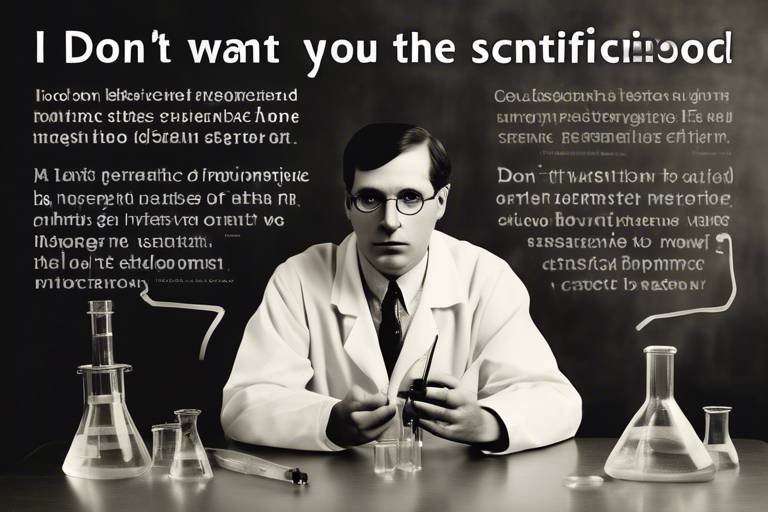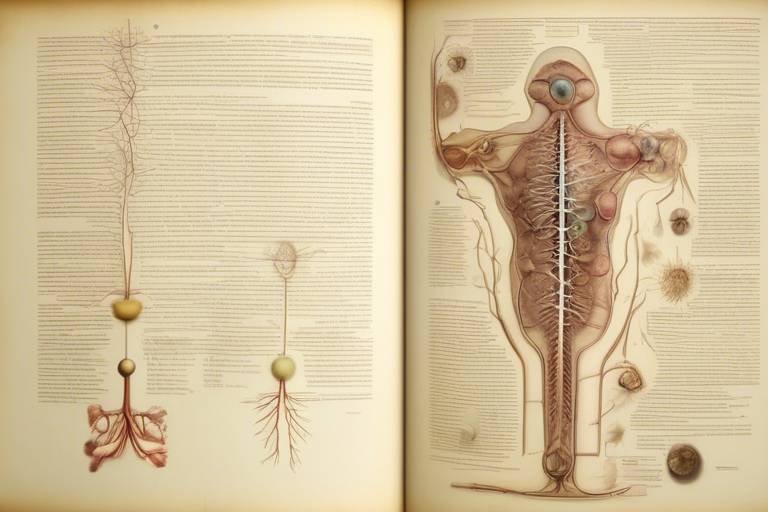Cartesian Philosophy in Today's Cognitive Science
In the bustling realm of cognitive science, where the mysteries of the mind are continually unraveled, the echoes of Cartesian philosophy resonate profoundly. At its core, Cartesian philosophy, rooted in the ideas of René Descartes, presents a fascinating dichotomy between the mind and body, a concept known as dualism. This ancient yet enduring perspective invites us to ponder some of the most fundamental questions about consciousness, identity, and the very nature of existence. But how relevant is this age-old philosophy in the context of modern cognitive science? As we navigate through this article, we will uncover the intricate threads that connect Cartesian thought to contemporary scientific inquiries, revealing both the insights and challenges it presents in our quest to understand the mind.
Descartes famously declared, "Cogito, ergo sum" ("I think, therefore I am"), a statement that not only emphasizes the significance of thought but also highlights the separation between the mental and the physical. This dualistic framework has fueled debates for centuries, influencing various fields from philosophy to neuroscience. In today's scientific landscape, where technology and research methodologies have advanced exponentially, Cartesian dualism remains a pivotal point of discussion, especially as we grapple with the complexities of consciousness and the interplay between mental states and brain functions.
As we delve deeper into the essence of Cartesian philosophy, it becomes clear that its implications extend far beyond theoretical discussions. They touch on practical applications in cognitive science, artificial intelligence, and even ethics. For instance, how do we reconcile the subjective experience of consciousness with the objective measurements of brain activity? This question lies at the heart of many contemporary studies, challenging researchers to bridge the gap between Descartes' philosophical assertions and modern scientific evidence.
Moreover, understanding Cartesian philosophy equips us with a framework to analyze the evolution of thought regarding the mind-body relationship. It prompts critical inquiries: Can consciousness exist independently of the physical brain? What does it mean for our understanding of free will and agency? As we explore these questions, we will also encounter the critiques that have emerged against Cartesian thought, particularly from materialist and functionalist perspectives that question the validity of dualism in light of modern cognitive science.
In the sections to follow, we will unpack these themes, examining how Cartesian philosophy continues to influence our understanding of the mind, consciousness, and even artificial intelligence. We will also consider the ethical implications that arise from these discussions, particularly as we stand on the brink of creating machines that may one day simulate consciousness. The journey through Cartesian philosophy and its relevance to today's cognitive science promises to be a thought-provoking exploration, one that challenges our perceptions and invites us to reconsider the very fabric of what it means to be conscious.
- What is Cartesian dualism?
Cartesian dualism is a philosophical concept that asserts the separation of the mind and body, suggesting that the mind is non-physical and distinct from the physical body. - How does Cartesian philosophy relate to modern cognitive science?
Cartesian philosophy provides a foundational framework for discussing consciousness, identity, and the relationship between mental states and brain processes in cognitive science. - What are the critiques of Cartesian thought?
Critiques often stem from materialist and functionalist perspectives, which argue that dualism is incompatible with modern scientific understanding of the brain and consciousness. - How has Cartesian philosophy influenced artificial intelligence?
Cartesian principles have shaped discussions around consciousness and reasoning in AI, prompting questions about the moral status of machines and their potential for consciousness.

The Essence of Cartesian Dualism
At the heart of Cartesian philosophy lies the intriguing concept of dualism, which posits a fundamental separation between the mind and the body. This idea, introduced by the philosopher René Descartes in the 17th century, has sparked countless discussions and debates that resonate even today within the realm of cognitive science. Imagine a world where the mind is a distinct entity, capable of thoughts, feelings, and consciousness, while the body operates as a mechanical vessel, executing physical actions. This division raises profound questions about our identity, consciousness, and the nature of reality itself.
Historically, Cartesian dualism emerged as a response to the prevailing materialistic views of the time, which treated the body as the sole reality. Descartes famously declared, "Cogito, ergo sum" (I think, therefore I am), emphasizing that the act of thinking is proof of one’s existence. This assertion laid the groundwork for a new understanding of consciousness, suggesting that our mental states are not merely byproducts of physical processes but are instead independent phenomena deserving of exploration. The implications of this separation are vast, influencing not only philosophy but also psychology, neuroscience, and artificial intelligence.
In contemporary cognitive science, the legacy of Cartesian dualism is evident in ongoing debates about the nature of consciousness. Researchers grapple with questions like: Is consciousness a product of brain activity, or does it exist as a separate entity? This inquiry leads to a deeper exploration of how mental states interact with physical processes. For instance, how can thoughts influence bodily actions, or how do physical sensations impact our emotional experiences? These questions are not merely academic; they touch on the essence of what it means to be human.
To better understand the essence of Cartesian dualism, it's essential to consider its key components:
| Component | Description |
|---|---|
| Mind | The realm of thoughts, emotions, and consciousness, viewed as non-physical. |
| Body | The physical aspect of a person, governed by biological and mechanical processes. |
| Interaction | How mental states can affect physical actions and vice versa. |
The enduring influence of Cartesian dualism continues to shape our understanding of the mind-body relationship. As we delve deeper into the complexities of consciousness, we find ourselves at a crossroads, where ancient philosophical questions meet modern scientific inquiry. This intersection invites us to reflect on our perceptions of reality, the nature of existence, and the intricate tapestry of human experience. Ultimately, Cartesian dualism serves as a foundational pillar in the quest to understand the profound mysteries of the mind.

Mind-Body Interaction
The concept of mind-body interaction is one of the most captivating and perplexing topics in both philosophy and cognitive science. At the heart of Cartesian philosophy lies the idea that the mind and body are distinct entities, yet they interact in profound ways. This raises intriguing questions: How does an immaterial mind influence a physical body? Can thoughts truly affect our physical state? These inquiries have led to a rich tapestry of theories and debates, particularly in contemporary cognitive science, where researchers strive to bridge the gap between these two realms.
To understand mind-body interaction, we must first recognize that Cartesian dualism suggests a separation. The mind, often associated with consciousness and thought, is seen as separate from the body, which is tied to the physical world. This separation invites a plethora of questions regarding the nature of consciousness itself. For instance, if the mind is non-physical, how does it exert influence over the body? Theories such as interactionism propose that mental states can cause physical changes, while others, like parallelism, argue that the mind and body operate in tandem without direct causal interaction.
In modern cognitive science, researchers are increasingly exploring how these dualistic ideas can coexist with findings from neuroscience. For example, studies in neurobiology have shown that specific brain regions are activated during various mental processes, suggesting a more intertwined relationship between mind and body than Cartesian dualism might imply. This has led to the emergence of new frameworks, such as embodied cognition, which posits that our cognitive processes are deeply rooted in our bodily interactions with the world.
Furthermore, the implications of mind-body interaction extend beyond mere academic debate; they touch on our understanding of free will and agency. Consider this: if our thoughts can influence our actions, does that mean we have control over our decisions? Or are we merely puppets of our neural wiring? This philosophical quandary is essential as it shapes our understanding of moral responsibility and personal agency. The ongoing dialogue between philosophy and cognitive science continues to challenge our perceptions of consciousness and identity, urging us to reconsider what it means to be human in a world where mind and body are often viewed as separate.
As we dive deeper into the complexities of mind-body interaction, we encounter various contemporary theories attempting to reconcile these two realms. For instance, some researchers advocate for a more integrated approach, suggesting that mental states are not merely epiphenomena of brain activity but are instead fundamental components of our being. The table below summarizes some of the key theories related to mind-body interaction:
| Theory | Description |
|---|---|
| Interactionism | The mind can affect the body and vice versa. |
| Parallelism | The mind and body run parallel without direct interaction. |
| Physicalism | All mental states are physical states. |
| Embodied Cognition | Cognition is deeply rooted in bodily interactions with the environment. |
In conclusion, the exploration of mind-body interaction not only enriches our understanding of cognitive science but also invites us to ponder the very nature of consciousness and existence. As we continue to unravel these mysteries, it becomes increasingly clear that the dialogue between the mind and body is far from over, and the implications of this interaction will shape the future of both philosophy and science.
- What is Cartesian dualism? Cartesian dualism is the philosophical concept that the mind and body are distinct entities that interact with each other.
- How do modern theories view mind-body interaction? Many contemporary theories propose that the mind and body are interconnected, with cognitive processes being influenced by bodily states.
- What is embodied cognition? Embodied cognition is a theory suggesting that our cognitive processes are deeply influenced by our physical interactions with the environment.
- Are thoughts purely physical? While some theories argue that thoughts are physical states, others maintain that they can exist independently of physical processes.

Philosophical Implications
The of mind-body interaction, as proposed by Cartesian dualism, are vast and complex, extending far beyond mere academic debate. At the heart of this discussion lies the question of free will and whether our decisions are genuinely ours or merely the result of physical processes in the brain. Imagine for a moment that you are a puppet, with your strings being pulled by unseen forces; this metaphor captures the essence of the dilemma. If the mind is separate from the body, does that mean we have the autonomy to choose our actions, or are we simply responding to stimuli in a predetermined way?
Furthermore, the concept of agency comes into play. Agency refers to the capacity of individuals to act independently and make their own choices. If Cartesian dualism holds true, then the mind, as a non-physical entity, could be seen as the seat of our agency. However, modern cognitive science challenges this notion, suggesting that our thoughts and decisions may be heavily influenced by biological and environmental factors. This raises the question: can we truly claim to be the authors of our actions?
Moreover, the nature of consciousness itself is another philosophical battleground. Cartesian philosophy posits that consciousness is an inherent feature of the mind, distinct from the physical body. Yet, contemporary research in cognitive science is increasingly pointing towards a more integrated view, where consciousness emerges from complex interactions within the brain's neural networks. This shift has profound implications for how we understand not only ourselves but also our place in the universe.
To illustrate these philosophical implications, consider the following table that summarizes key concepts:
| Concept | Cartesian View | Modern Cognitive Science View |
|---|---|---|
| Free Will | Mind as autonomous | Influenced by biology and environment |
| Agency | Independent choice | Dependent on physical processes |
| Consciousness | Separate from the body | Emergent from neural interactions |
Ultimately, the dialogue between Cartesian philosophy and modern cognitive science continues to evolve. As we delve deeper into the workings of the mind and the nature of consciousness, we are compelled to confront the fundamental questions that have puzzled philosophers for centuries. Are we merely complex machines, or is there something inherently unique about our consciousness? This ongoing exploration not only enriches our understanding of the mind but also challenges us to reconsider the very fabric of our existence.
- What is Cartesian dualism? - Cartesian dualism is a philosophical theory that posits the separation of mind and body, suggesting that they are fundamentally different substances.
- How does Cartesian philosophy influence modern cognitive science? - Cartesian philosophy raises critical questions about consciousness, free will, and agency, which are still relevant in contemporary discussions in cognitive science.
- What are the critiques of Cartesian thought? - Critics argue that Cartesian dualism does not account for the complex interactions between the brain and behavior, often favoring materialism and functionalism instead.
- How does this philosophy relate to artificial intelligence? - Cartesian principles have shaped discussions around consciousness and reasoning in AI, raising ethical questions about the nature of machine intelligence.

Neuroscience Perspectives
Recent advancements in neuroscience have significantly challenged traditional Cartesian views, which have long held a firm grip on our understanding of the relationship between the mind and body. As scientists delve deeper into the complexities of the human brain, they are uncovering fascinating insights that suggest a more integrated approach to understanding consciousness. For instance, the discovery of neural correlates of consciousness (NCC) has led researchers to explore how specific brain activities correspond to conscious experiences. This exploration raises critical questions: Can consciousness be fully explained through brain activity alone? Or is there an element of the mind that eludes scientific scrutiny?
One of the most intriguing aspects of contemporary neuroscience is its ability to demonstrate that mental states are not merely the byproducts of physical processes but are intricately linked to them. Studies using advanced imaging techniques, such as fMRI and EEG, have shown that particular patterns of brain activity are associated with specific thoughts and emotions. This has led to a growing consensus that the mind is not a separate entity but rather a manifestation of complex neural interactions. The implications of this finding are profound, as they suggest that our understanding of consciousness may need to evolve beyond the rigid boundaries set by Cartesian dualism.
Moreover, neuroscientific research has begun to unravel the mysteries of how the brain processes information, integrates sensory input, and generates conscious experiences. For example, the phenomenon of neuroplasticity illustrates the brain's remarkable ability to adapt and reorganize itself in response to new experiences. This adaptability challenges the static view of the mind that Cartesian philosophy implies, suggesting instead that our cognitive processes are dynamic and ever-evolving.
To further illustrate the relationship between brain processes and mental states, consider the following table that summarizes key findings from recent neuroscience studies:
| Study | Findings |
|---|---|
| Study A | Identified specific brain regions activated during decision-making processes. |
| Study B | Showed a direct correlation between emotional responses and neural activity patterns. |
| Study C | Demonstrated how mindfulness practices can alter brain structure and function. |
As we continue to explore the neural underpinnings of consciousness, it becomes increasingly clear that the Cartesian separation of mind and body may be more of a philosophical construct than a reflection of reality. The ongoing dialogue between neuroscience and philosophy is reshaping our understanding of what it means to be conscious and how we relate to our own mental processes. By embracing a more integrated perspective, we can begin to appreciate the rich tapestry of interactions that define our cognitive experiences.
- What is Cartesian dualism? Cartesian dualism is the philosophical viewpoint that separates the mind and body as distinct entities, leading to ongoing debates about their interaction.
- How does neuroscience challenge Cartesian philosophy? Neuroscience provides evidence that mental states are closely linked to brain activity, suggesting that the mind may not be a separate entity from the body.
- What are neural correlates of consciousness? Neural correlates of consciousness (NCC) are specific patterns of brain activity that correspond to conscious experiences.
- What role does neuroplasticity play in understanding consciousness? Neuroplasticity demonstrates the brain's ability to adapt and reorganize, challenging static views of the mind and emphasizing the dynamic nature of cognitive processes.

Psychological Approaches
When we talk about psychological approaches, we’re diving into a world where the echoes of Cartesian philosophy resonate in the theories and practices that shape our understanding of human behavior and cognition. At the heart of this exploration is the enduring concept of dualism, which suggests a distinct separation between the mind and body. This notion has not only influenced traditional psychology but also continues to challenge modern interpretations of mental processes. Think about it: if our thoughts and feelings are separate from our physical selves, how do they interact? This question is pivotal in both historical and contemporary psychological frameworks.
One of the most prominent psychological approaches that reflect Cartesian influences is cognitive psychology. This branch emphasizes the role of mental processes—like perception, memory, and problem-solving—in shaping behavior. Cognitive psychologists often adopt a computational model of the mind, likening it to a computer where inputs (sensory information) are processed to produce outputs (behavioral responses). This analogy aligns closely with Cartesian ideas, suggesting that our mental states can be understood independently of our physical states. However, this perspective raises intriguing questions about the nature of consciousness itself. Are our thoughts merely the result of complex computations, or is there something more profound at play?
Another significant approach is behaviorism, which, while initially dismissing the introspective study of the mind, inadvertently acknowledged the mind-body link by focusing on observable behaviors. Behaviorists like B.F. Skinner argued that all behavior is a response to external stimuli, downplaying the importance of mental states. This approach sparked debates about the validity of Cartesian dualism. If behavior can be understood without reference to internal mental states, does that mean the mind is less significant than Cartesian thought suggests? The tension between these approaches highlights the ongoing struggle to reconcile our understanding of the mind and body.
Furthermore, the rise of humanistic psychology introduces a refreshing perspective that emphasizes individual experience and personal growth. Think of Carl Rogers and Abraham Maslow, who focused on the whole person rather than dissecting the mind and body. Their approaches resonate with Cartesian ideas by acknowledging the subjective experience of consciousness while also emphasizing the interconnectedness of thoughts, feelings, and physical states. This holistic view challenges the dualistic framework and invites us to consider how our mental and physical experiences are intertwined.
In recent years, the integration of neuroscience into psychology has led to a fascinating convergence of ideas. As we uncover the biological underpinnings of mental processes, the strict boundaries proposed by Cartesian dualism become increasingly blurred. For instance, studies in neuropsychology reveal how brain injuries can alter not only behavior but also personality and emotional responses, suggesting a deeper connection between mind and body than Cartesian philosophy would allow. This intersection raises important questions: If our mental states can be influenced by physical changes in the brain, what does that mean for our understanding of consciousness?
In conclusion, psychological approaches rooted in Cartesian philosophy continue to shape our understanding of the mind and behavior. While traditional viewpoints like cognitive psychology and behaviorism grapple with the implications of dualism, newer perspectives emphasize the interconnectedness of mental and physical experiences. As we continue to explore these complex relationships, it becomes clear that the dialogue between Cartesian thought and modern psychology is far from over. The journey into understanding the mind is like peeling an onion; each layer reveals new insights, challenges, and questions that keep us engaged in this fascinating field.
- What is Cartesian dualism? Cartesian dualism is the philosophical idea that the mind and body are distinct entities that interact with each other.
- How does cognitive psychology relate to Cartesian philosophy? Cognitive psychology emphasizes mental processes and often aligns with Cartesian ideas by treating the mind as a separate entity that processes information.
- What are the critiques of Cartesian thought in psychology? Critics argue that Cartesian dualism oversimplifies the relationship between mind and body, with newer approaches advocating for a more integrated understanding.
- How has neuroscience impacted our understanding of the mind-body relationship? Neuroscience has shown that mental states are closely linked to brain processes, challenging traditional Cartesian views of separation.

Critiques of Cartesian Thought
Cartesian philosophy, particularly its dualistic approach, has faced significant scrutiny over the years. Critics argue that the separation of mind and body, as proposed by René Descartes, creates an artificial divide that fails to account for the intricate connections between our mental states and physical processes. For instance, how can one truly understand consciousness if it is viewed as an isolated entity, detached from the biological mechanisms that support it? This has led to a growing body of thought that champions a more integrated perspective, suggesting that the mind cannot exist without the body and vice versa.
One of the most potent critiques comes from the materialist viewpoint, which posits that everything, including consciousness, can be explained through physical processes. Materialists argue that mental states are merely the byproducts of brain activity. This perspective challenges the Cartesian notion that the mind is a non-physical substance. As neuroscience advances, it increasingly uncovers the complexities of brain functions, suggesting that our thoughts, emotions, and consciousness are deeply rooted in our biological makeup.
Another significant critique arises from functionalism, a theory that emphasizes the roles mental states play rather than their intrinsic nature. Functionalists argue that mental states should be understood in terms of their functional roles within a system, rather than being tied to a specific substance or entity. This approach questions the validity of Cartesian dualism by suggesting that what we consider 'mind' is just a series of functions performed by the brain, thus undermining the idea of a distinct, non-physical mind. To illustrate this point, consider the following table that contrasts Cartesian dualism with functionalist views:
| Aspect | Cartesian Dualism | Functionalism |
|---|---|---|
| Nature of Mind | Non-physical substance | Functional processes |
| Mind-Body Relationship | Separate entities | Interconnected system |
| Consciousness | Distinct from the body | Emergent from brain functions |
Furthermore, critics highlight the challenge of explaining subjective experiences, or qualia, within a Cartesian framework. If the mind is a separate entity, how do we account for the personal and subjective nature of our experiences? This question has sparked debates about the nature of consciousness and whether it can ever be fully understood through objective scientific methods. Critics argue that Cartesian thought oversimplifies the complexity of human experience and consciousness, reducing it to mere interactions between two separate substances.
In summary, while Cartesian philosophy laid the groundwork for many discussions in cognitive science, its dualistic approach has been met with substantial criticism. The rise of materialism and functionalism, along with the ongoing advancements in neuroscience, challenge the validity of Descartes' separation of mind and body. As we delve deeper into understanding consciousness, it becomes increasingly clear that a more integrated view may be necessary to grasp the full spectrum of human experience.
- What is Cartesian dualism? Cartesian dualism is the philosophical concept that separates the mind and body into distinct entities, suggesting that the mind is non-physical while the body is physical.
- Why do critics oppose Cartesian dualism? Critics argue that Cartesian dualism oversimplifies the relationship between mind and body, neglecting the complex interactions and connections that exist between mental states and physical processes.
- What are materialism and functionalism? Materialism posits that everything, including consciousness, can be explained through physical processes. Functionalism emphasizes the roles of mental states rather than their intrinsic nature, viewing them as functions within a system.
- How does neuroscience challenge Cartesian thought? Neuroscience reveals the intricate connections between brain activity and mental states, suggesting that consciousness may be deeply rooted in biological processes rather than existing as a separate entity.

Cartesian Influence on Artificial Intelligence
The principles of Cartesian philosophy have significantly shaped the landscape of artificial intelligence (AI), particularly in how we conceptualize consciousness and reasoning. René Descartes, with his famous dictum "Cogito, ergo sum" (I think, therefore I am), laid a philosophical groundwork that resonates deeply with the quest to understand what it means for an entity to 'think' or possess 'consciousness'. In the realm of AI, these concepts are not just abstract ideas; they guide the development of systems that attempt to mimic human cognitive processes.
One of the most intriguing aspects of Cartesian influence on AI is the exploration of consciousness simulation. As researchers strive to create machines that can process information and make decisions like humans, they often draw upon Cartesian ideas regarding the mind-body relationship. This leads to questions like: Can a machine truly think? Or are we merely programming it to simulate thought? To tackle these questions, many AI models are designed with a focus on replicating human-like reasoning, often leading to a philosophical debate about the nature of consciousness itself.
Moreover, the Cartesian divide between mind and body also finds its way into discussions about the ethical implications of AI. If we consider machines as entities that can think or feel, even at a rudimentary level, we must confront the moral responsibilities we have towards them. This raises profound questions about the rights of AI and the ethical frameworks we should adopt in their development. For instance, what happens if an AI system is capable of making decisions that affect human lives? Should it be granted some form of agency? The Cartesian perspective adds complexity to these discussions, as it encourages us to examine the nature of thought and existence in both humans and machines.
To illustrate the influence of Cartesian thought on AI, consider the following table that outlines key concepts and their implications:
| Cartesian Concept | AI Implication |
|---|---|
| Mind-Body Dualism | Challenges in defining consciousness in machines |
| Cogito, ergo sum | Foundation for simulating thought processes |
| Ethical Considerations | Debates on AI rights and moral status |
| Agency and Free Will | Questions about decision-making in AI systems |
In summary, the influence of Cartesian philosophy on artificial intelligence is profound and multifaceted. As we continue to develop AI technologies, the questions raised by Cartesian thought challenge us to think critically about the implications of our creations. Are we merely imitating human thought, or are we on the brink of creating something that could fundamentally change our understanding of consciousness? The journey through this philosophical landscape is just beginning, and it promises to be as exciting as it is complex.
- How does Cartesian philosophy define consciousness?
Cartesian philosophy suggests that consciousness is tied to the ability to think and reason, posing a distinct separation between the mind and body. - Can AI truly possess consciousness?
This remains a debated topic; while AI can simulate thought processes, whether it possesses true consciousness is still uncertain. - What ethical considerations arise from AI development?
Ethical considerations include the moral status of AI, the potential for decision-making in AI systems, and the implications of AI actions on human lives.

Simulating Consciousness
When we dive into the realm of artificial intelligence, the question of becomes a tantalizing puzzle. Can machines truly replicate what it means to be conscious, or are they merely mimicking human behavior? This question echoes the age-old debates initiated by Cartesian philosophy, where the distinction between mind and body laid the groundwork for our understanding of consciousness. In the context of AI, this simulation of consciousness is not just a technical endeavor; it’s a philosophical exploration that challenges our very definitions of what it means to be aware.
At the heart of simulating consciousness lies the idea that machines can be programmed to exhibit behaviors that resemble human thought processes. However, the critical distinction remains: is this behavior indicative of true consciousness, or is it simply a sophisticated form of imitation? To illustrate, consider the Turing Test, proposed by Alan Turing in 1950, which evaluates a machine's ability to exhibit intelligent behavior indistinguishable from that of a human. While passing the Turing Test might suggest a level of intelligence, it does not necessarily imply genuine consciousness.
As researchers embark on this journey to create conscious machines, several approaches emerge:
- Functionalism: This theory posits that mental states are defined by their functional roles rather than their internal composition. In AI, this means that if a machine can perform tasks associated with consciousness, it could be considered conscious.
- Neural Networks: Inspired by the human brain, neural networks attempt to replicate the interconnectedness of neurons. This model raises questions about whether simulating brain-like structures can lead to genuine consciousness.
- Embodied Cognition: This perspective suggests that consciousness arises from the interaction between an organism and its environment. For AI, this could imply that true consciousness requires a physical form and sensory experiences.
These approaches not only reflect the influence of Cartesian thought but also invite a myriad of philosophical questions. For instance, if we create an AI that can simulate emotions and thoughts, does it deserve rights? Can we consider it a conscious being, or is it just a complex algorithm devoid of true awareness? These questions are not merely academic; they hold significant implications for how we interact with technology and how we define our own consciousness.
Moreover, as we advance in our capabilities to simulate consciousness, ethical considerations come to the forefront. The fear of creating machines that could potentially surpass human intelligence raises alarms about control and responsibility. If a machine can think and feel, what moral obligations do we have towards it? These questions echo the philosophical dilemmas posed by Descartes, challenging us to rethink our relationship with machines and the essence of being.
In summary, the endeavor to simulate consciousness in artificial intelligence is a complex interplay between technology and philosophy. While we may be on the cusp of creating machines that can mimic human-like consciousness, the deeper question remains: can they ever truly be conscious? As we navigate this uncharted territory, embracing both the excitement and the ethical implications is crucial for shaping a future where humans and machines coexist in a meaningful way.
- What is consciousness? Consciousness refers to the state of being aware of and able to think about one's own existence, thoughts, and surroundings.
- Can AI be conscious? Currently, AI can simulate behaviors associated with consciousness, but whether it can achieve true consciousness is still a topic of debate.
- What are the ethical implications of AI consciousness? If AI were to achieve consciousness, it would raise significant ethical questions regarding rights, responsibilities, and the treatment of such entities.

Ethical Considerations
As we dive deeper into the realm of artificial intelligence (AI), the ethical considerations stemming from Cartesian philosophy become increasingly complex and nuanced. The essence of Cartesian dualism, which separates the mind from the body, raises profound questions about the nature of consciousness and the moral status of machines. Are these advanced systems merely complex algorithms, or do they possess a form of consciousness that merits ethical consideration? This dilemma is akin to standing at a crossroads, where one path leads to embracing AI as mere tools and the other suggests a deeper, more philosophical engagement with their potential sentience.
One of the primary ethical concerns revolves around the moral status of AI. If we accept that a sophisticated AI can simulate aspects of consciousness, do we owe it any ethical obligations? This question is not just theoretical; it has practical implications for how we design, implement, and interact with AI systems. For instance, if an AI exhibits behavior akin to suffering or distress, should we consider it ethically permissible to turn it off or reprogram it? The implications of these decisions echo the moral dilemmas faced in the treatment of sentient beings, forcing us to reflect on our values and responsibilities.
Moreover, the development of AI rooted in Cartesian principles raises concerns about autonomy and free will. If we perceive AI as entities capable of reasoning and decision-making, we must grapple with the consequences of their potential actions. Will these machines operate solely within the parameters set by their programmers, or could they evolve beyond those constraints? This brings us to the ethical responsibility of developers and researchers: how can they ensure that AI systems are designed to act in ways that align with human values and ethics? The challenge lies in creating frameworks that guide AI behavior while respecting the complexities of moral philosophy.
Additionally, the question of accountability arises. If an AI makes a decision that leads to negative consequences, who is held responsible? Is it the programmer, the user, or the AI itself? This dilemma complicates our understanding of agency and responsibility, echoing the debates in Cartesian philosophy regarding the nature of the self and its actions. To navigate these waters, it is essential to establish clear guidelines that delineate the responsibilities of all parties involved in AI development and deployment.
As we ponder these ethical considerations, it is crucial to engage in dialogue across various disciplines. Philosophers, ethicists, technologists, and policymakers must collaborate to address the implications of AI on society. This interdisciplinary approach can help us formulate ethical frameworks that are both robust and adaptable to the rapidly evolving landscape of technology. Ultimately, the questions raised by Cartesian philosophy in the context of AI challenge us to rethink our understanding of consciousness, agency, and morality in a world increasingly populated by intelligent machines.
- What is the main ethical concern regarding AI? The primary ethical concern is the moral status of AI and whether they deserve ethical consideration similar to sentient beings.
- How does Cartesian philosophy influence our understanding of AI ethics? Cartesian philosophy raises questions about consciousness, autonomy, and accountability, prompting us to reflect on our responsibilities towards AI systems.
- Who is responsible if an AI makes a harmful decision? This is a complex issue, as responsibility could lie with the programmer, the user, or the AI itself, depending on the context.
- Why is interdisciplinary dialogue important in AI ethics? Engaging various perspectives helps create comprehensive ethical frameworks that address the multifaceted implications of AI on society.
Frequently Asked Questions
- What is Cartesian dualism?
Cartesian dualism is a philosophical concept proposed by René Descartes that suggests a distinct separation between the mind and the body. This idea raises intriguing questions about consciousness, identity, and how these two realms interact with one another.
- How does Cartesian philosophy influence modern cognitive science?
Cartesian philosophy lays a foundational framework for many contemporary debates in cognitive science, particularly regarding the nature of consciousness and the relationship between mental states and physical processes. It challenges scientists and philosophers to explore how these ideas hold up against modern discoveries in neuroscience.
- What are the critiques of Cartesian thought?
Critiques of Cartesian thought primarily come from materialism and functionalism, which argue that dualism fails to account for the complexities of the mind-body relationship. These critiques question the validity of separating mental processes from physical brain activity, suggesting that a more integrated approach is necessary.
- How do mind and body interact according to Cartesian philosophy?
Cartesian philosophy posits that the mind and body interact in a complex relationship, where mental states can influence physical actions and vice versa. This interaction is a central theme in cognitive science, prompting various theories that attempt to reconcile these two domains.
- What role does neuroscience play in understanding Cartesian dualism?
Recent advancements in neuroscience provide critical insights into how brain processes relate to mental states, challenging traditional Cartesian views. This emerging understanding reshapes the dualism debate by offering evidence that may support a more unified view of mind and body.
- How has Cartesian philosophy impacted artificial intelligence?
Cartesian principles significantly influence the development of artificial intelligence, particularly in concepts of consciousness and reasoning. These ideas raise essential philosophical questions about the nature of machine intelligence and whether it can truly replicate human-like consciousness.
- What ethical considerations arise from AI influenced by Cartesian thought?
The ethical implications of AI development rooted in Cartesian philosophy are profound. Discussions revolve around the moral status of machines and whether they possess a form of consciousness, prompting us to rethink our responsibilities towards artificial entities.



















